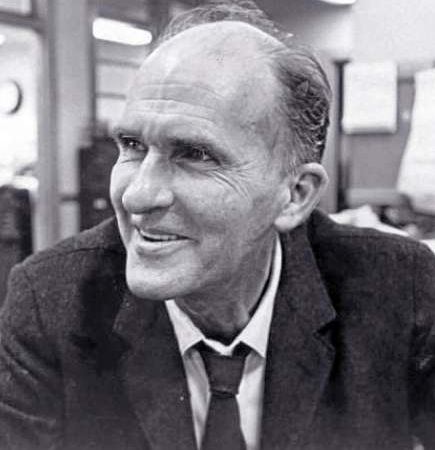I was very pleased to recently receive an award from the Maine Press Association for writing the state’s second best opinion column. This is my 26th year of writing this weekly column, and the award reminded me of the wonderful newspaper columnists who inspired me, led by Bill Clark.
Bill Clark described himself as “a country boy with country leanings.” He wrote a column in this newspaper about patriotism, farms, forests, rural towns, local characters and the hills of Maine.
Indeed, “The Hills of Maine and Other Stories” is one of eight books in which Clark captured his Maine, a Maine that in some respects disappeared about the time Clark’s column in this newspaper ended. He was compiling “The Hills of Maine” when he died in 1988.
William M. Clark was born in Caratunk in 1913, graduated from Colby College, served in the military and put together an interesting Maine work history: teacher, restauranteur, logger, sawmill operator, electrician, bulldozer driver, and finally, writer of newspaper and magazine columns and books.
Four of Clark’s books are about a fictional town called Cedar River, populated with characters so vivid that some believed them to be real.
“It may be the mingling of men and the wild things along the vague lines which separate the natural from the semi-controlled that has kept Cedar River people from conforming to the patterned lives of the down river world,” he wrote.
Ever since I read those words, I’ve wanted to live in Cedar River. Mount Vernon is as close as I’ve been able to get — and it’s pretty darned close!
On the cover of the third Cedar River book is the best promotional paragraph ever written: “This book is a product of probing. Its pages reflect the upriver people of Maine, not an imaginary bunch of characterized clowns but a living group of men who have chosen independence of thought over the promise of riches. … We give you Cedar River, Maine, the only town ever able to salvage two thousand pounds of meat from an eight-hundred-pound moose. The formula for this is not for sale!”
Clark also published a book of his newspaper columns written between 1957 and 1967 for this and other Guy Gannett newspapers. The man could get to the point quickly. A Memorial Day column began, “They died for you. I saw them die.” Nothing more needed to be said.
Clark often wrote with humor and had little use for bureaucrats and environmentalists, yet his newspaper career began in 1956 after he wrote a letter to the Press Herald criticizing “the stupidities of thoughtless woodcutting.”
Recognizing his unique voice, the paper quickly signed him up for a regular column that became “Some Logrolling.” I have read Clark’s columns and books so many times and quoted him so often that some of his passages stuck in my memory.
A favorite was his description of one of his teachers, Mrs. Kelly. “She could pound facts into the heads through any openings she chose. If the normal openings were particularly tough, she opened a gash or two and worked on that.”
But it was Clark’s reverence for the land that continues to grab me today. Here’s a passage from a column titled “True Heritage.”
“He said, ‘When I was a boy, even then, people were talking about worn out land. But they didn’t know anything much to do for it except move away. Farmers know better now, and that’s good. A man ought to do something for the land when the land has done so much for him.’
“I remember him saying that and he said it with all the sincerity that a man could say anything. And I agree with him. If I ever had time enough and money to use, I’d take another piece of land and do what I tried to do with the hill farm, except I’d finish the job. I’d put it right back where it originally was. Because the land is the only true heritage there is.”
In “The Presence of the Past,” Clark wrote that instead of the deep woods he “would rather walk the acres where men lived and used the land for pasture or for field crops long ago … It is the finding of old foundations and the tracing of the once plain barnyard borders that I enjoy. Wherever men worked, they left something.
“When a man walks through a region like that, he can feel the presence of his predecessors,” wrote Clark. “On all the old lands, there are lessons. They are the marks men made, the intimacies of an era. They should not be lost.”
Neither should this priceless collection of wisdom, nor the memory of the man who provided it.
George Smith is a writer and TV talk show host. He can be reached at 34 Blake Hill Road, Mount Vernon 04352, or georgesmithmaine@gmail.com. Read more of Smith’s writings at www.georgesmithmaine.com.
Send questions/comments to the editors.



Comments are no longer available on this story